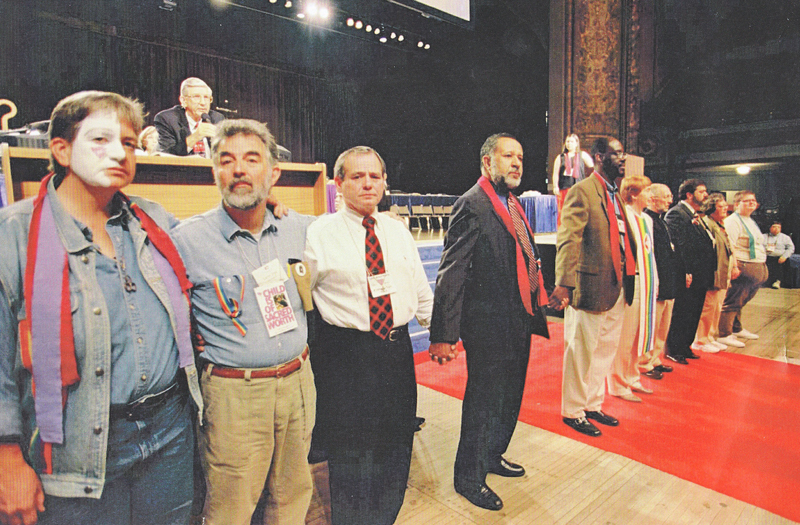For the next week or so, leaders of the 7 million member United Methodist Church will meet in Portland for their quadrennial General Conference. More than one hundred petitions related to human sexuality, mainly (of course) LGBT issues, will be considered by the 864 delegates, continuing a debate that the UMC has had every four years since 1972.
READ: Methodist General Conference to discuss LGBT issues — again
That’s forty-four years of debate. Over one issue. When it started, Richard Nixon was president. Gasoline cost 36 cents a gallon. The Vietnam War was in full swing.
Forty-four years of arguing over one issue.
I am not an expert on Methodists and I don’t know what’s going to happen at this quadrennial meeting. But I do have a prediction: there will be no agreement. Either one side will win, or the other side will win, or the can will be kicked down the road.
This issue does not seem to be resolvable through dialogue, at least not in any venue larger than a family, a group of friends, or the occasional local congregation. Since it can’t be resolved by dialogue, it comes down to politics — organizing, money, campaigns, power, votes. All of which invites deep cynicism in Christian contexts where the official language includes talk of moral discernment, the Holy Spirit, and God’s will.
A key player in the United Methodist fight is the Reconciling Ministries Network (RMN). Just prior to this conference, the RMN released a brave, plaintive statement from 111 Methodist LGBT clergy members, deacons, elders, and candidates for such offices. Outing themselves in this statement, these clergy risk discipline or dismissal under current UMC policy.
The statement is framed as a love letter from these religious leaders to the denomination. You baptized us, they say. You trained us. You helped us see and exercise our gifts. We love this community. We have served faithfully and kept our covenant promises to you. But “You have not always remained faithful to us.” Why? Because “you have required that we not bring our full selves to ministry, that we hide from view our sexual orientations and gender identities.”
The statement continues: “We are told to simply leave.” But, “is leaving home ever that simple? We are United Methodists…” Don’t make us leave, they say. But if you do make us leave, rest assured that there will always be a next generation of vulnerable young LGBT people in your pews. They are at risk of suicide and despair because of the teaching some of you are offering. Stop hurting them, please.
Notice the kind of appeal this is. It’s an appeal for compassion, for inclusion, for acceptance, for dignity. It rings with the language of family — we are part of your family, don’t kick us out — which resonates especially if you know anything about the number of homeless LGBT kids who do get kicked out of their families or feel the need to flee. I think it’s also an appeal for recognition of courage — we are risking everything to plead for your acceptance, Won’t you soften your heart?
And the answer will be NO. From many. Whether a majority will say no will be tallied by the votes.
Why this no? I don’t need to be at the meeting. I know what people will think, and what they will say, because I’ve been in a hundred of these “conversations”: Because the Bible says a clear no in Genesis 1-2, Leviticus 18, and Romans 1. Because God designed humans as male and female and sex as male for female. Because it is not part of Christian Tradition. Because no Christian Leader that our side respects agrees with you people.
Because the church is not permitted to bless sin. Because the church does not want ministers who embody aberration and sin. Because we don’t want to lose members who will leave if we accept you fully, including whole countries in some parts of the world. Because we are well and truly freaked out by gender and sexual orientation diversity. Because we don’t want our children to be influenced by you. Because we yearn nostalgically for “back in the day” when these issues didn’t even exist, or at least, no one made us think about them.
It’s a titanic clash, epic, truly tragic, unresolvable, filled with conflict and pain. To me, by now, the arguments are stale and circular. What I mainly hear is the howl of pain of a small minority of Christians (and many traumatized ex-Christians) crushed under the wheel of a 2000-year-old religious tradition that cannot quite figure out how to account for their existence. It’s all so very, very sad.





